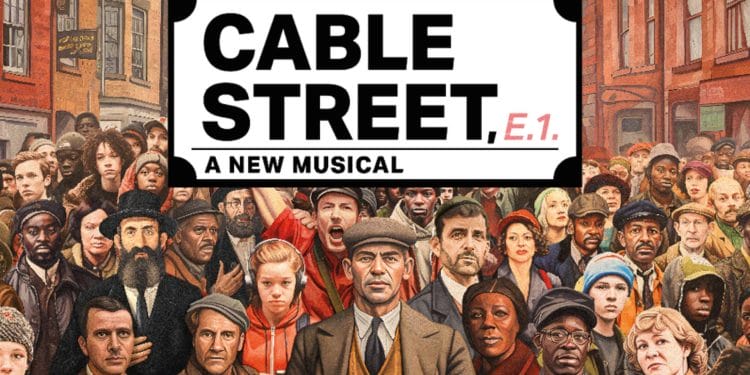The world premiere of a new British musical CABLE STREET, bringing to life a vital part of London’s rich diversity and history, opens at The Large, Southwark Playhouse Borough on Friday 16 February 2024 to Saturday 16 March 2024.
CABLE STREET tells the story of the people of the East End and their community solidarity in 1936, as three young impoverished British workers: 19 year old Jewish lad Sammy, Mairead a feisty Irish Catholic baker, and Ron a recent arrival to Cable Street but a Lancastrian born and bred – all try to find work and passionately live their lives in the multi-cultural melting pot that was, and still is, Cable Street E1.
Their lives would change forever on Sunday 4 October 1936, when the East End showed its powerful ability to unite in the face of adversity as the Battle of Cable Street was fought and won – but which side will the youngsters and their families be fighting on? Full cast TBA.
CABLE STREET is a powerful musical showing how a disparate group of people can unite to stand against fascism – and to make a difference. The show is written by composer/lyricist Tim Gilvin and playwright Alex Kanefsky whose nan witnessed the Battle of Cable Street.
Their shared vision was to tell the famous story of the Battle and how a community took fought against prejudice. Both writers discovered they were each working on projects about Cable Street, when Alex first heard Tim’s song Only Words (still in the show), about a Jewish man living on Cable Street, who cannot condone the mass call to action against the fascist marchers – so they joined forces!
They discovered there were so many connections to the Battle of Cable Street that still resonate today. The East End is still a vibrant and diverse community dealing with prejudice and adversity: so they decided that both the book and the music in CABLE STREET view the events through a modern lens, with a contemporary score blending a range of styles, to tell the tale of racial intolerance defeated by community action – a message which is as powerful today as it was in 1936.
Writer Alex Kanefsky says: “I’d always been fascinated by the story of Battle of Cable Street. My family have roots in the East End, and when I came to live here, following in their footsteps, I found myself cycling down Cable Street itself. I stopped to look at the huge mural showing the Battle, and it took my breath away. The story still has a semi-mythical hold on popular radical and Jewish history, and I became more and more aware of the parallels with today. A financial depression, political upheaval, and powerful figures scapegoating minorities for all of society’s ills. The battle of 1936 feels a deeply resonant, modern story of hope in dark times.”
Composer/lyricist Tim Gilvin says: “I heard about this part of London’s history in 2016: a time when the politics of division and fear were once again in full swing. The Battle of Cable Street feels like an urgent story to tell today – as history risks repeating itself. Our musical, CABLE STREET, tells a story of the diverse communities of London coming together to face down the very forces that sought to divide them.”
CABLE STREET, directed by Adam Lenson, sees its residents take a stand against prejudice on their street, as Sir Oswald Mosley announces he will lead his 1000s of fascist Blackshirt supporters to march into the heart of the Jewish community on Cable Street. The government failed to ban the march. With 7000 members of the Metropolitan police deployed to protect the British Union of Fascists (BUF); the clear provocation saw local workers, members of the Jewish and Irish communities, trade unionists, members of the Labour and Communist parties, women and children defend their diverse community from fascist intimidation at the Battle of Cable Street: with cries of They Shall Not Pass – victory was theirs, for the united people of the East End.

















